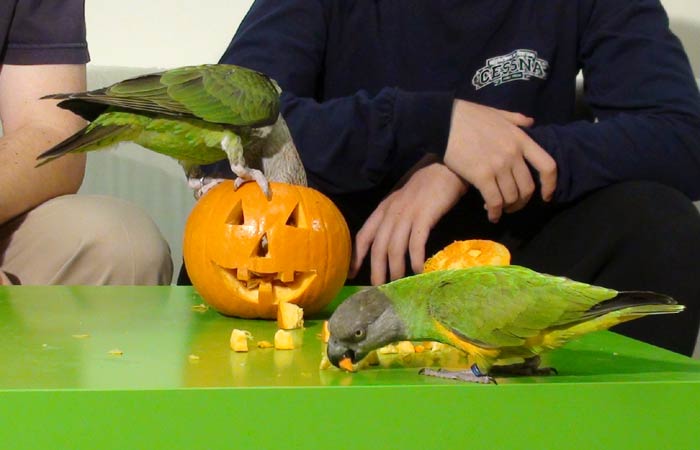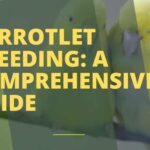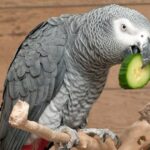Yes, cockatoos can eat pumpkin. It’s a nutritious and safe treat for them.
Pumpkins are a fantastic source of vitamins and minerals, offering health benefits to cockatoos including better digestion, vibrant feathers, and overall well-being. Unseasoned, cooked, or raw pumpkin suits their dietary needs and can be incorporated into their meals for variety.
It’s important to remove the seeds and ensure that any pumpkin fed to cockatoos is free from harmful substances like pesticides. Introducing new foods like pumpkin to a cockatoo’s diet should be done gradually, observing for any adverse reactions. Keep portion sizes appropriate to their dietary regime to prevent obesity. Always consult with a veterinarian regarding the best dietary practices for your feathered friend.
Cockatoos And Their Diet
Cockatoos are known for their dynamic diets, enjoying a variety of foods. Understanding what they eat is crucial for their health and happiness. Pumpkins are a tasty treat, but can cockatoos safely enjoy them? Let’s dive into the dietary needs and natural foods of these vibrant birds.
Natural Foods For Wild Cockatoos
Wild cockatoos feast on a bounty provided by Mother Nature. Their diet is diverse, offering everything needed for a balanced diet.
- Seeds: A staple in the cockatoo’s diet, providing essential nutrients.
- Nuts: Full of healthy fats, these offer energy and are a favorite treat.
- Fruits: Like pumpkin, fruits offer vitamins and a sweet taste.
- Berries: Small and packed with antioxidants, perfect for a snack.
- Nectar: Provides natural sugars that give quick boosts of energy.
- Insects: A source of protein, helping in muscle development.
Captive Cockatoo Dietary Needs
Cockatoos in captivity still crave variety in their diets. A proper diet ensures they maintain vivid feathers and overall health.
| Food Type | Benefits |
|---|---|
| Pellets | Formulated to provide complete nutrition. |
| Fresh Vegetables | Offer enzymes and important vitamins. |
| Fresh Fruits | Like pumpkins, supply natural sugars and fiber. |
| Grains | Whole grains deliver energy and aid digestion. |
| Protein | Eggs or cooked meats support muscle and feather growth. |
By mimicking a wild cockatoo’s diet, pumpkin and other fresh, whole foods can keep pet cockatoos thriving.
The Nutritional Profile Of Pumpkin
Pumpkins are not just for carving during Halloween; they’re a powerhouse of nutrients. These orange delights are rich in vitamins, minerals, and other beneficial components. They are also low in calories, making them a superb treat for your feathered friends, like cockatoos.
Health benefits associated with pumpkinHealth Benefits Associated With Pumpkin
Pumpkins pack a punch when it comes to health benefits. They contain vitamin A which is good for vision. The fiber in pumpkins helps with digestion. They also have vitamin C and potassium, which support heart health. Let’s not forget antioxidants like beta-carotene, which fight free radicals.
- Vitamin A: Essential for eyesight
- Fiber: Aids digestive health
- Vitamin C: Boosts the immune system
- Potassium: Maintains heart function
- Antioxidants: Protects cells from damage
Pumpkin Seeds And Flesh: What’s Good
Both pumpkin seeds and flesh provide goodness. The seeds are great for protein and healthy fats. The flesh is full of fiber and key nutrients.
| Part of Pumpkin | Nutrient Benefit |
|---|---|
| Flesh | Rich in fiber, vitamins |
| Seeds | Source of protein, Omega-3s |
Safety Of Pumpkin For Cockatoos
Pumpkin is not only a tasty treat but also a nutritious option for your feathered friends. Can cockatoos safely enjoy this autumn favorite? With the right preparation, pumpkin can be a healthy snack for your cockatoo. It’s full of vitamins, minerals, and fiber. But first, let’s address some concerns and proper serving methods.
Concerns Over Raw Pumpkin
Feeding cockatoos raw pumpkin requires caution. Here’s why:
- Pumpkin seeds can be a choking hazard, so remove them.
- Pesticide residue on the skin might harm your bird.
- Too much raw pumpkin can lead to digestive issues.
Always wash the pumpkin thoroughly and consider peeling it to eliminate risks.
Proper Preparation And Serving Size
To ensure your cockatoo’s safety, follow these steps:
- Peel and wash the pumpkin to remove any chemicals.
- Cut the pumpkin into small, manageable pieces.
- Cook pumpkin to soften it, making it easier to digest.
Serving size matters. Offer pumpkin as a treat, not a meal. A few small bites are enough.
| Pumpkin Type | Preparation | Serving Size |
|---|---|---|
| Raw | Peel, Wash, Remove Seeds | 1-2 Small Pieces |
| Cooked | Steam or Bake until Soft | 1-2 Small Pieces |
Remember, treats like pumpkin should make up less than 10% of your cockatoo’s diet. Always consult with a vet for the best dietary advice for your pet.

Credit: www.facebook.com
Introducing Pumpkin To Your Cockatoo
Introducing Pumpkin to Your Cockatoo can be a delightful addition to their diet. These vibrant squashes offer essential vitamins and fiber. Cockatoos can enjoy pumpkin, but it’s important to introduce it correctly.
Step-by-step Introduction
- Wash the pumpkin: Clean outside dirt to ensure safety.
- Prepare small pieces: Cut pumpkin into bite-size chunks for easy consumption.
- Remove seeds: Seeds can cause choking and are best avoided.
- Start with a taste: Offer a small piece to gauge interest.
- Watch for reactions: Ensure there are no negative effects on their health.
- Increase gradually: Slowly add more pumpkin if they enjoy it.
Effective Way To Mix With Other Foods
Mixing pumpkin with other foods your cockatoo loves can be beneficial. Here’s a simple guide:
- Blend with favorites: Combine pumpkin with fruits like apples.
- Try a puree: Offer a pumpkin puree for a new texture.
- Add to treats: Include pumpkin pieces in homemade bird treats.
- Mix with grains: Stir through cooked quinoa or brown rice.
Potential Health Advantages For Cockatoos
Do you know cockatoos can enjoy pumpkin, too? This vibrant veggie isn’t just for humans. It can provide various health benefits for our feathery friends.
Boosting Immunity
Pumpkin is a powerhouse of vitamins. Vitamins like A and C in pumpkin can help keep a cockatoo’s immune system strong. A strong immune system fights off sickness. This means a happier, healthier bird.
- Vitamin A – vital for immune function.
- Vitamin C – an antioxidant that protects cells.
Supporting Feather Health
Beautiful feathers are a sign of a healthy cockatoo. Pumpkin seeds are rich in Omega-3 and Omega-6 fatty acids. These nutrients contribute to shiny feathers. The zinc found in pumpkin helps maintain feather strength as well.
| Nutrient | Benefit |
|---|---|
| Omega-3 & Omega-6 | Enhances feather shine |
| Zinc | Strengthens feathers |
Signs Of A Well Balanced Cockatoo Diet
Cockatoos thrive on diverse and nutritious diets, and pumpkin can be a tasty addition. But how do you tell if your feathered friend is getting all it needs? Recognizing a well-balanced diet is key to your cockatoo’s health. It shows through their behavior and physical condition. Let’s explore the signs that point to a cockatoo eating just right.
Normal Behavior In Cockatoos
A happy cockatoo is active, curious, and social. When a diet is well-balanced, you’ll notice certain behaviors:
- Plenty of energy for play and interaction
- Consistent vocalizations – they ‘talk’ and ‘sing’ regularly
- Normal sleep patterns, showing they’re relaxed and comfortable
- Keen interest in their surroundings and toys
These signs indicate your cockatoo’s needs are met, from nutrition to mental stimulation.
| Good Signs | Potential Warning Signs |
|---|---|
| Playful | Less active or lethargic |
| Chatty | Quiet or less vocal |
| Good sleeper | Restlessness |
Physical Signs Of Good Nutrition
Alongside behavior, a cockatoo’s body also reflects its diet:
- Bright, clear eyes show overall wellness
- Smooth beak and nails, not overly brittle or flaky
- Feathers should be vibrant, without bald spots or dull color
- Healthy weight; not too skinny or overweight
Regular checkups with a vet can confirm your cockatoo’s nutritional success. They can measure these signs and keep your bird on track with the right pumpkin portions and diet variety.
Foods To Avoid In A Cockatoo’s Diet
While cockatoos can enjoy a tasty treat of pumpkin, not all foods are safe for these vibrant birds. Understanding which foods to avoid is crucial for their health and wellbeing. Certain items can be toxic, while others disrupt a balanced diet essential for a cockatoo’s vitality.
Toxic Foods For Cockatoos
Cockatoos must steer clear of certain toxic foods to stay healthy. These include:
- Avocado: The persin in it is harmful.
- Chocolate: Contains theobromine, which is poisonous.
- Caffeine: Causes cardiac malfunction.
- Alcohol: Can be deadly, even in small amounts.
- Apple seeds: Release cyanide when digested.
Understanding Proper Food Balance
A well-rounded diet is key for a cockatoo’s health. This includes a variety of:
| Food Category | Examples |
|---|---|
| Fruits | Mango, Pear, Berries |
| Vegetables | Broccoli, Carrots, Peas |
| Proteins | Cooked lean meats, Legumes |
| Grains | Brown rice, Quinoa, Barley |
Provide the right balance to prevent nutritional deficiencies. Monitor your bird’s intake and consult with a vet for personalized diet advice.
Expert Tips On Feeding Cockatoos
Are you a proud cockatoo parent? Proper nutrition is crucial for these vibrant birds. Pumpkins are not only safe but also nutritious for cockatoos. Let’s explore expert tips for a happy, healthy feathered companion.
Advice From Avian Vets
Avian vets recommend moderation with any treat, including pumpkin. An occasional pumpkin treat can be part of a cockatoo’s diet. Vet professionals suggest the following:
- Remove seeds and skin before offering pumpkin to your cockatoo. These parts can be hard to digest.
- Pure, cooked pumpkin is best. Avoid canned versions with added sugar or preservatives.
- A small dose of beta-carotene found in pumpkins can support eye health.
- Combine pumpkin with other bird-safe fruits and vegetables for a balanced diet.
Incorporating Variety In Meals
A varied diet is essential for cockatoos. It keeps them physically and mentally stimulated. Consistent inclusion of new, healthy foods can enhance their well-being:
| Food Type | Benefits | Example Foods |
|---|---|---|
| Vegetables | Offers vitamins, minerals | Pumpkin, carrots, bell peppers |
| Fruits | Provides hydration, sweetness | Apples, berries, melon |
| Nuts | Source of protein, fats | Almonds, walnuts (in moderation) |
Ensure a balance in every meal. Too much of one food group can cause nutritional gaps. Follow a feeding schedule and monitor your cockatoo’s health. Consult your vet for individual nutritional needs and portions.
Common Questions About Cockatoos And Pumpkins
Welcome to the ‘Common Questions About Cockatoos and Pumpkins’ section of our blog, where we dive into the specifics of feeding pumpkins to these playful parrots. Many owners wonder if this autumnal vegetable is a suitable treat. We’ll explore the availability of pumpkins and how to handle any leftovers safely.
Seasonality And Availability
Pumpkins are widely available during the fall season. This is the best time to introduce your cockatoo to pumpkin as a treat.
- Pie pumpkins – Best for your bird. They are small and usually sweeter.
- Large carving pumpkins – Can be used, but not as flavorful or nutrient-dense.
Check your local farmer’s market or grocery store for organic options. Always choose fresh, unsprayed pumpkins. This ensures your cockatoo gets the most nutrients without harmful chemicals.
| Month | Availability |
|---|---|
| September to November | High – Fresh Harvest |
| December to August | Low – Off-season |
Handling Leftover Pumpkin
Managing extra pumpkin after your bird has enjoyed its share is essential. Avoid waste and maintain safety.
- Store: Keep leftover raw pumpkin in a sealed container in the fridge.
- Freeze: Cut it into chunks and freeze for longer storage.
- Cook: Cook the pumpkin, mash it, and freeze in ice cube trays for easy portions.
Never leave pumpkin out for more than a few hours. Spoiled pumpkin can harm your cockatoo. Dispose of any pumpkin that looks or smells off.

Credit: www.youtube.com
When To Consult An Avian Veterinarian
Is your feathered friend acting odd at meal times? Keep reading to find out when a trip to the avian vet is a must.
Ensuring your cockatoo maintains a healthy diet is crucial. Sometimes, you might observe behaviors or health changes that are concerning. It’s vital to know when professional advice is needed.
Unusual Eating Habits
If you notice a sudden lack of interest in food or an obsession with a single food type, like pumpkin, it could signal a problem. Signs to watch for include:
- Ignoring favorite treats
- Picking at food but not really eating
- Difficulty in swallowing or showing discomfort while eating
Don’t wait – you should contact your vet if any of these signs persist.
Changes In Health After Diet Alteration
If you’ve introduced pumpkin to your cockatoo’s menu, observe for any changes. Key health changes may include:
| Sign | Possible Reason |
|---|---|
| Weight loss or gain | New diet not balanced |
| Feather problems | Lack of required nutrients |
| Behavior shifts | Possible food intolerance |
Consistent changes in health after adding new foods should be evaluated by a vet to prevent potential health issues.

Credit: www.pinterest.com
Conclusion
Summing up, pumpkins can be a nutritious snack for cockatoos in moderation. Full of beneficial vitamins and minerals, they offer a health boost to your feathered friend’s diet. Remember to prepare the pumpkin properly and serve in small quantities. Your cockatoo’s well-being will surely benefit from this tasty treat!
Ryan Everhart is a passionate bird enthusiast and blogger, primarily writing on his website, Avian Whispers. His journey into the world of bird blogging began with a deep interest in parrots, a species that captivated his attention for their intelligence and social behavior. Over time, his content expanded to cover a broader range of bird species, offering insights into bird behavior, care, habitats, and conservation.
Ryan is dedicated to educating his audience, which includes both new bird owners and seasoned enthusiasts. His writing is filled with personal experiences, expert knowledge, and practical advice on bird care. Through Avian Whispers, he aims to foster a deeper appreciation for birds, emphasizing their role in nature and the joys of having them as pets.
Starting with articles focused on parrots, Ryan’s work now encompasses a diverse range of topics such as feeding, training, habitat enrichment, and bird health. His love for birds extends beyond parrots, diving into various avian species. His informative and heartfelt writing reflects his commitment to the well-being of birds and the desire to help others connect with these creatures.
As a growing voice in the bird blogging community, Ryan strives to provide a platform where bird lovers can learn, share experiences, and connect over a shared passion for avian life. His blogs are not only educational but also serve as a reminder of the importance of protecting and nurturing the bond between humans and birds.




